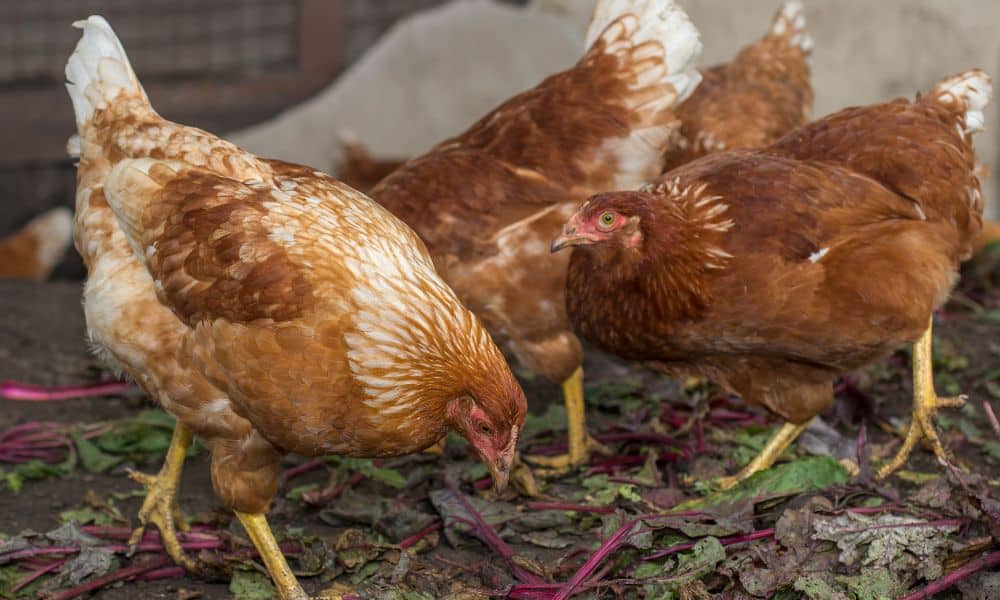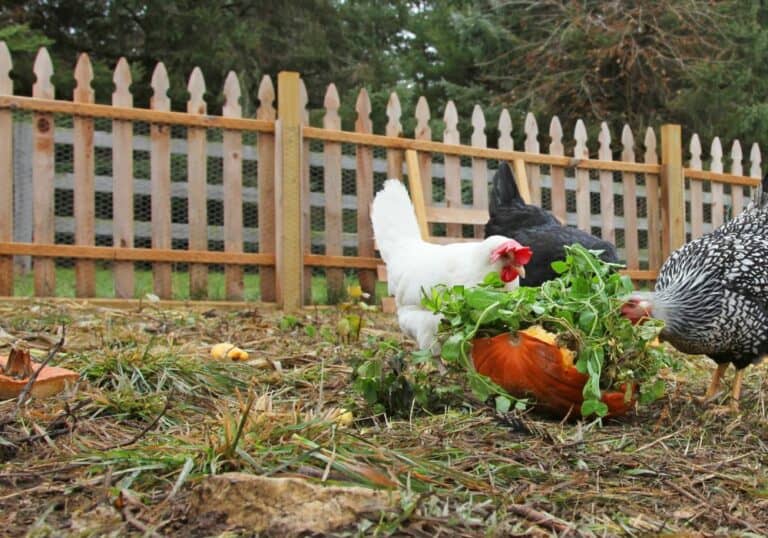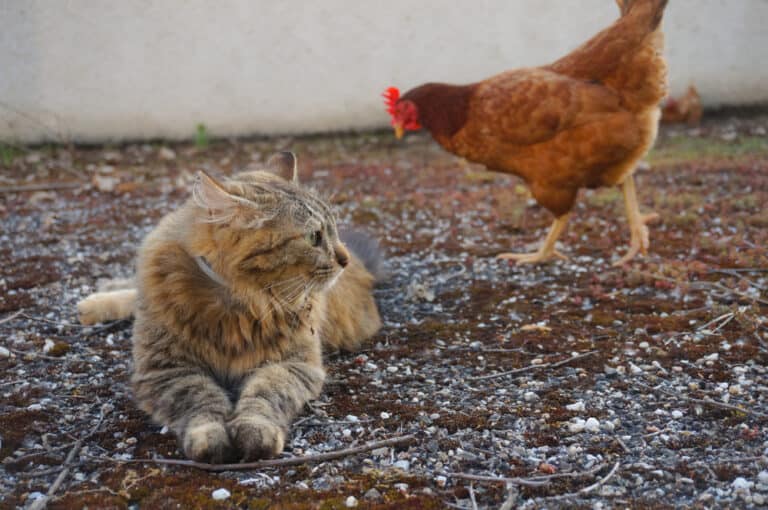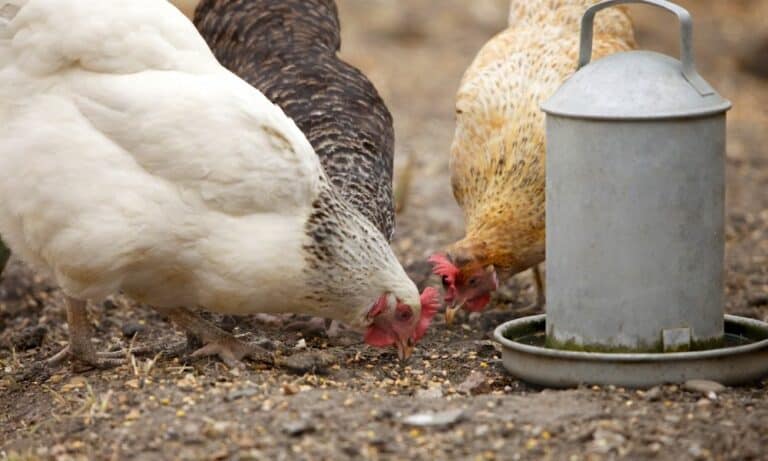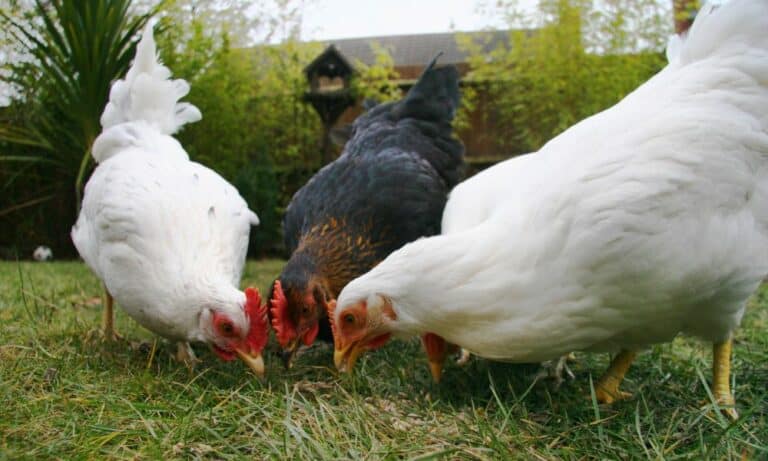Most chicken breeds are calm and friendly, but you can always spot at least one aggressive bird in your yard prone to bullying others. In most cases, confrontations end up with injuries and feathers flying.
You probably wonder how do you stop chickens from pecking each other in such a situation. While there is no need to react when noticing occasional pecking, aggressiveness followed by bleeding and injured chickens requires immediate reaction.
Reasons for Chickens Pecking Each Other
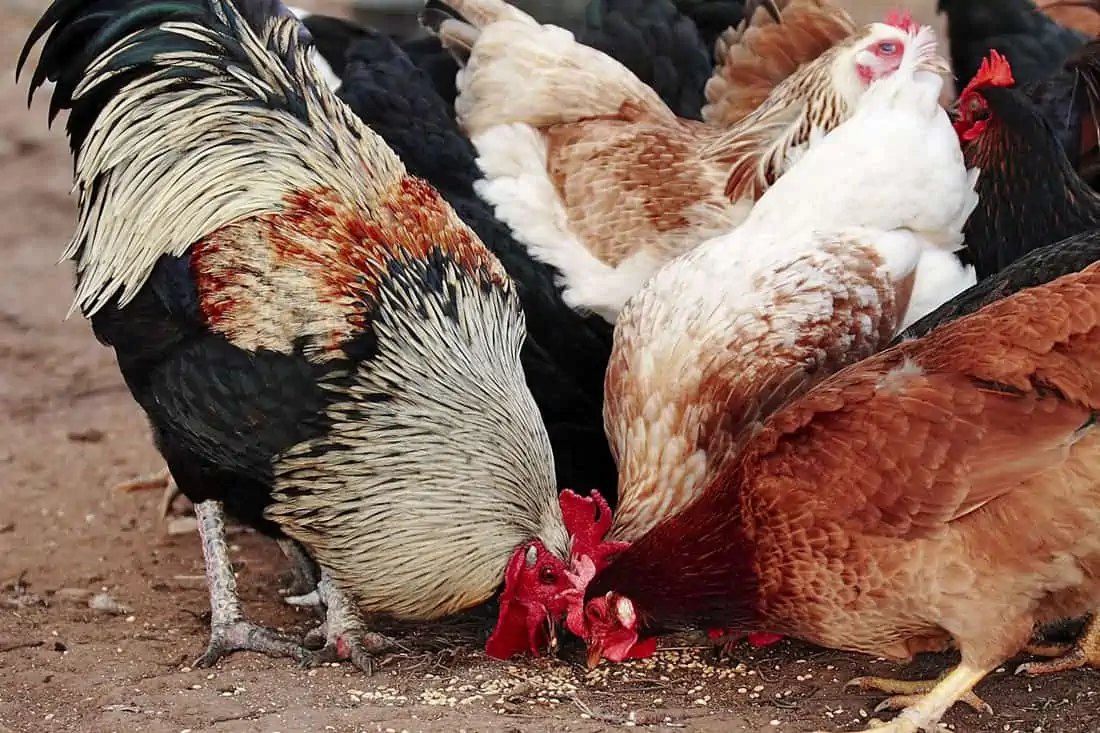
Pecking is a common thing you can see in poultry farms. Reasons for such behavior are numerous, including natural ones and those signifying more severe problems. One thing is for sure. Once pecking begins, it quickly develops into a vicious habit.
1. Pecking order (chicken hierarchy)
The pecking order is a social hierarchy among animals that includes a dominant (alpha) chicken, followed by other flock members ranked by power in descending order. Such an arrangement implies that dominant chickens peck lower-ranged ones to show power.
The pecking order is typically established by personality, age, and protective instincts. For instance, newly introduced chickens are at the hierarchy bottom initially and can win a better position over time.
2. Illness and injury
Chickens often peck sick and injured members, driving them from the flock to protect others. Besides, injured birds with exposed skin due to damaged feathers are typical victims.
For instance, chickens with grimy, rough feathers are often victims of pecking. Unfortunately, other flock members enjoy plucking them, leading to additional injuries. Be prepared for some roosters to peck chicks to death.
3. External parasites
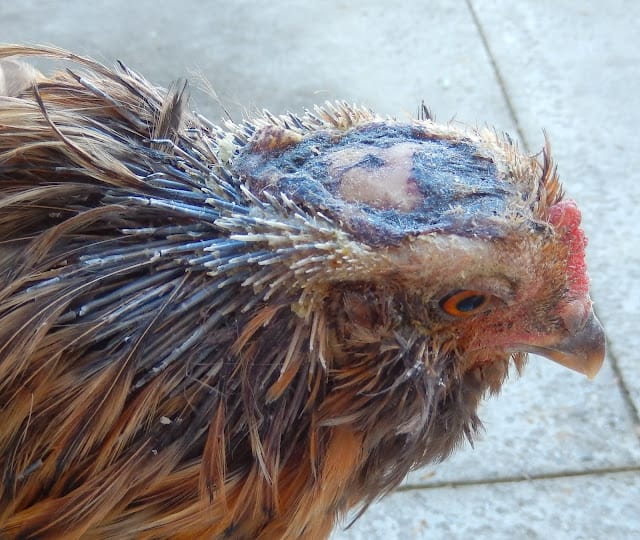
Chickens infested with lice, ticks, mites, and bed bugs start pecking or plucking their plumage to eat these external parasites and clean themselves. You can expect other flock members to help them in this hygienic activity, which is how pecking begins.
4. Stress
Chickens under stress often start pecking each other and plucking feathers. Since numerous stressors can trigger such behavior, you should carefully observe the situation and remove them.
For instance, your fowl may reach with pecking when experiencing changes in everyday life, like the following:
- Overcrowding
- Large flocks with 30+ members in a confined space
- Diet change or imbalanced diet
- Transportation and new accommodations
- Lack of nesting boxes
- New nest boxes layout
- Excessive artificial light
- Lack of darkness during the night
- Introduction to a new flock
- Constant predator attacking
- Cold weather
- High temperatures inside the coop without adequate ventilation
- Flock mate death
5. Boredom
Bored chickens without daily activities and possibilities to roam may start picking others to fulfill time and to entertain themselves. That often happens during the winter when poultry is enclosed in a coop.
6. Molting period
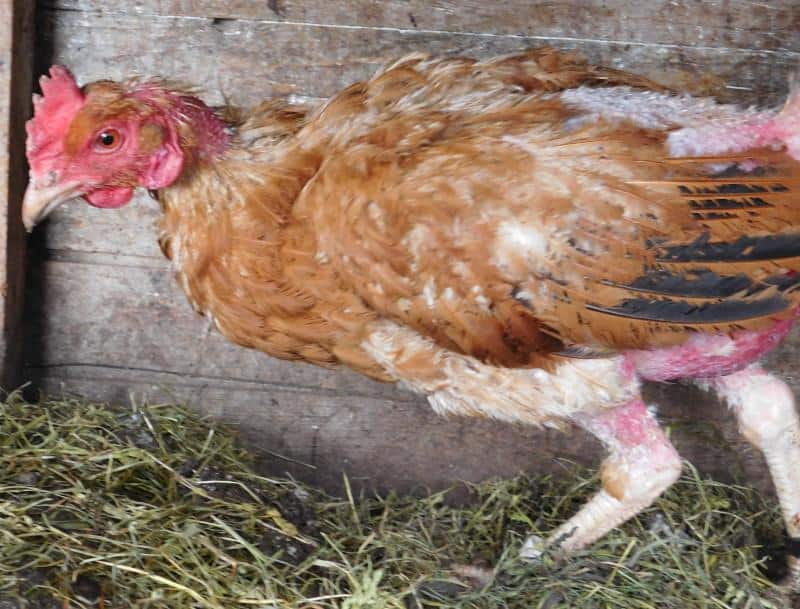
Chickens typically look smaller than usual and vulnerable while getting new feathers. Sometimes, aggressive flock members may start bulling them and pecking their plumage during that period.
7. Curiosity
Chickens often start pecking each other to learn using their beaks for such an activity. Unfortunately, sometimes things get out of hand.
For instance, breeding feather-legged, bearded, and crested fowl with those without these traits is often a reason for exploring. So, you can see less-feathered chickens pecking the plumage of differently-looking flock members.
8. Poor diet
Inadequate nutrition, particularly food lacking in fiber, phosphorus, and sodium, causes aggression and potential pecking. Another problem is a salt deficiency that leads to overusing preen glands. Fowl use oil from these glands to preen themselves, but their salty taste may become a reason for pecking.
When chickens suffer from protein deficiency, especially the amino acid methionine, they tend to peck other members’ feathers. It is a typical case in flocks fed with low-protein corn and scratches.
9. Cannibalistic pecking
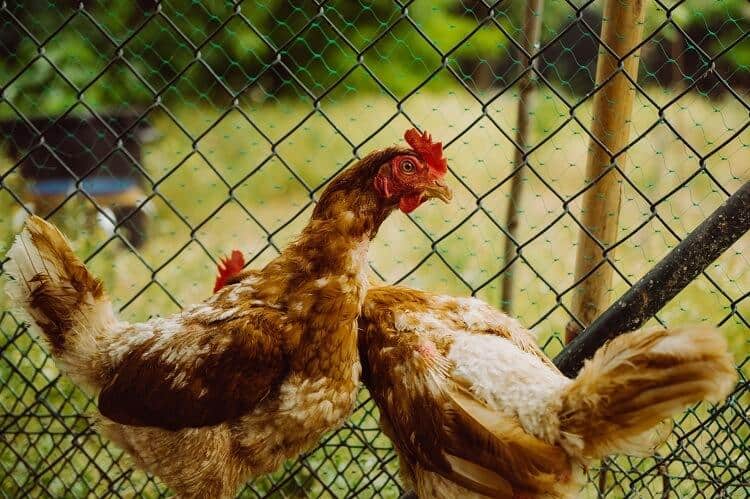
Cannibalistic pecking includes two behaving types. Chickens can peck other flock members or themselves when they spot injured skin and visible blood.
In most cases, the cause of such behavior is a lack of macronutrients in their diet. They become even more aggressive when a victim is unable to react due to illness, injury, or death.
Ways to Stop Chickens From Pecking Each Other
Owners need to understand their chickens and prevent bad behavior, like pecking. Give your best to understand the pecking order and never react when it is within the limits of the usual chickens’ social order.
It is short-lived behavior without significant consequences, but you should react when bullying becomes too complex and endangers the victim’s life. Finding a way to stop constant and repeated bullying that appears without a particular reason is necessary.
1. Find the reason
Your first step when registering pecking behavior among chickens is identifying the cause, particularly when it becomes too aggressive. The only way to stop such behavior is to eliminate the primary problem.
2. Identify and remove persistent peckers
Isolating, rehoming, or removing persistent peckers is sometimes your only solution. You can try to trim their beaks and separate them for a week as the first measure, but removing them from the flock is inevitable if these methods fail.
3. Protect the victim
Identify a primary victim that unsuccessfully tries to escape and remove it from the flock immediately when noticing wounds. Such a chicken often has most feathers damaged and plucked, and you can see changes on the victim’s head, lower back, around the vent, and above the tail.
Additionally, its skin is inflamed, red, and irritated, with visible blood traces and formed scabs. Keep it separated until its skin heals, and feathers start re-growing. Also, make a sanctuary for potential victims to give them space to escape.
4. Enough space
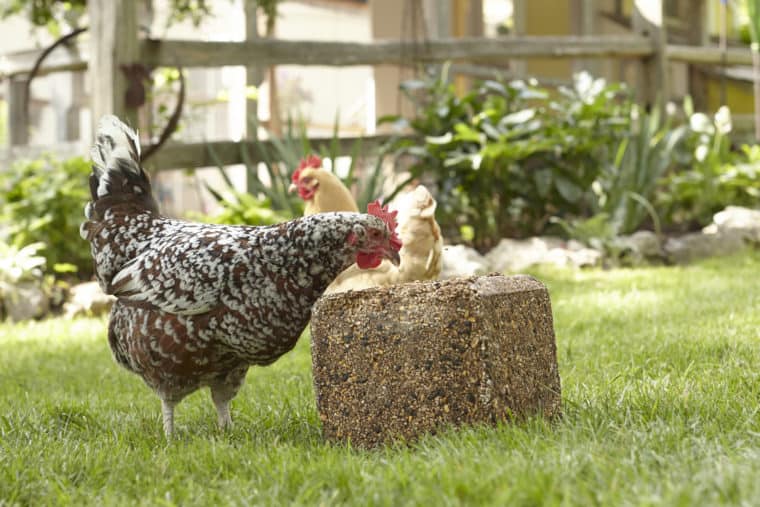
Never allow having a cramped chicken coop since the only way to prevent overcrowding is to provide enough space for each flock member.
Each adult chicken requires 2 to 4 sq ft (0.19 – 0.37 m2) in the coop and 8 to 10 sq ft (0.74 – 0.93 m2) in the run. Providing less space almost always leads to nervousness, aggression, and pecking.
5. Enough nesting boxes
Provide enough nesting boxes for egg-laying hens. The best option is to install one per 3 to 4 hens and keep them away from light sources and noise. Remember that the vent becomes red right after egg laying, making it a desired target for pecking.
6. Balanced diet
Ensure a balanced diet for your chickens packed with protein, minerals, fiber, and vitamins. The best option is a combination of adequate chicken feed, greenery, treats, and supplemental food. Remember to provide enough fresh water for your flock and enough calcium for laying hens.
7. Well-ventilated coops
Excellent ventilation in the coop prevents nervousness, anxiety, aggression, and consequent pecking. Remember that the ideal temperature for chickens is 65 to 75 F (18.5 – 24 C), while chicks require 90 to 95 F (32 – 35 C). The optimum relative humidity in the chicken coop should be 50 to 70%.
Never expose your flock to high humidity and extreme temperature fluctuations to prevent illness. That is a way to protect weak chickens from bullying.
8. Adequate lighting
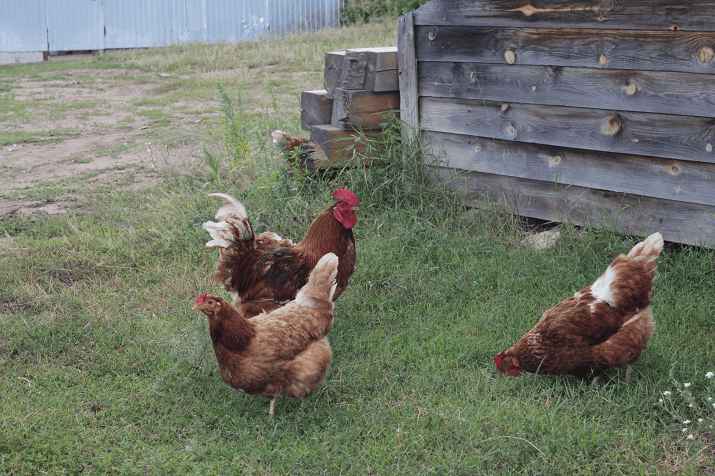
Limit chickens’ exposure to light at night and provide at least eight hours of darkness in that period. About 16 hours of daylight is enough for chickens’ well-being. Remember that disproportionate lighting often causes violent behavior.
Besides, avoid installing white bulbs with power over 40 watts. If you need more powerful bulbs for heating chicks, use red or infrared ones.
9. Dust bath
Help chickens stay clean and parasite-free by providing ideal conditions for dust bathing. Fill a container long 24 inches (61 cm), wide 15 inches (38 cm), and deep 12 inches (30.50 cm) with soil, sand, and wood ash, and let your fowl enjoy a dust bath.
10. Prevent boredom
Create chicken toys to entertain them and prevent boredom. Let them roam freely for at least a few hours daily, and offer them seed blocks, fresh greens, and hung boredom-buster treats. Additionally, make chicken swings, provide a surface to scratch, and tree branches to stand on.
11. Reduce flock size
An oversized flock packed in inadequate space is one of the most common reasons that lead to pecking. In numerous flocks, fowl have a problem establishing a hierarchy, which leads to stress and aggression. The additional problem is that finding a pecker is almost impossible in the crowd.
12. New flock members’ introduction
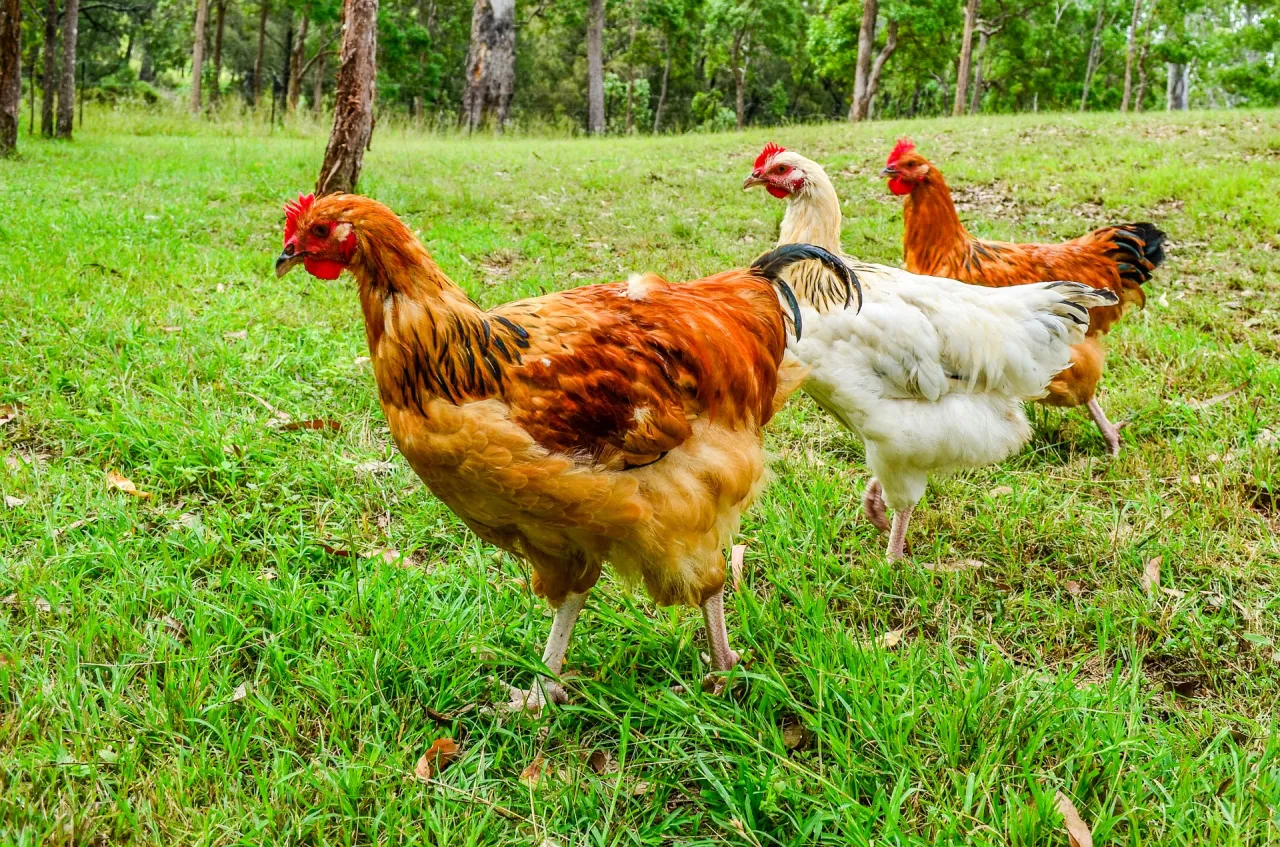
Wisely introduce new flock members to prevent pecking. Never add only one chicken to an established group since it automatically becomes the lowest-ranked member according to the packing order. You can expect other birds to peck newcomers to prevent their own status loss.
13. Remove extra roosters
Removing extra roosters from the flock prevents fighting for dominance. The ideal flock includes 7 to 10 hens per mature cock, and it is the only way to provide undisturbed mating without injuries and possibly fatal outcomes.
14. Remove hens
When you want to keep a few roosters for meat, the only way to prevent fighting is to remove laying hens from the flock. Without them, cocks become calmer due to lacking motivation to show dominance.
Summary
The first thing to do when noticing chickens peck each other is to understand the difference between bullying and pecking orders. Excessive pecking is a typical sign that something is wrong in your flock. Therefore, check their diet and accommodation, and look for stressors to find the primary reason for such behavior. The next step is to stop it.

